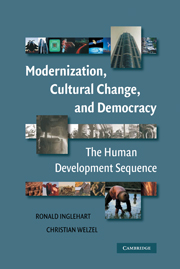Book contents
- Frontmatter
- Contents
- Dedication
- Acknowledgments
- Foreword by Hans-Dieter Klingemann
- Introduction
- PART I THE FORCES SHAPING VALUE CHANGE
- 1 A Revised Theory of Modernization
- 2 Value Change and the Persistence of Cultural Traditions
- 3 Exploring the Unknown: Predicting Mass Responses
- 4 Intergenerational Value Change
- 5 Value Changes over Time
- 6 Individualism, Self-Expression Values, and Civic Virtues
- PART II THE CONSEQUENCES OF VALUE CHANGE
- Conclusion: An Emancipative Theory of Democracy
- Bibliography
- Index
2 - Value Change and the Persistence of Cultural Traditions
Published online by Cambridge University Press: 05 September 2012
- Frontmatter
- Contents
- Dedication
- Acknowledgments
- Foreword by Hans-Dieter Klingemann
- Introduction
- PART I THE FORCES SHAPING VALUE CHANGE
- 1 A Revised Theory of Modernization
- 2 Value Change and the Persistence of Cultural Traditions
- 3 Exploring the Unknown: Predicting Mass Responses
- 4 Intergenerational Value Change
- 5 Value Changes over Time
- 6 Individualism, Self-Expression Values, and Civic Virtues
- PART II THE CONSEQUENCES OF VALUE CHANGE
- Conclusion: An Emancipative Theory of Democracy
- Bibliography
- Index
Summary
Modernization theorists from Karl Marx to Daniel Bell have argued that socioeconomic development brings pervasive cultural changes. But cultural theorists from Max Weber to Samuel Huntington have claimed that cultural values have an enduring and autonomous influence on society. Paradoxically as it may seem, both schools are right. This chapter presents empirical evidence of massive cultural change and the persistence of distinctive cultural traditions.
We analyze evidence of cultural change from the Values Surveys, the largest investigation ever made of attitudes, values, and beliefs around the world. These surveys have carried out four waves of representative national surveys, in 1981–3, 1989–91, 1995–97, and 1999–2001. They cover eighty-one societies on all six inhabited continents, containing more than 85 percent of the world's population.
Our thesis holds that socioeconomic development is linked with a broad syndrome of distinctive value orientations. Does such a syndrome exist? The Values Surveys contain hundreds of items, and not all of them tap important aspects of cross-cultural variation. In order to test the thesis that socioeconomic development brings systematic changes in basic values, we first need to identify a limited number of key dimensions that tap important values and then determine whether they are linked with socioeconomic development. Our theoretical framework implies that we should find two such dimensions, one linked with industrialization and the other with the rise of postindustrial society.
In previous research, Inglehart (1997) analyzed aggregated national-level data from the forty-three societies included in the 1989–91 Values Survey, finding large and coherent cross-cultural differences.
- Type
- Chapter
- Information
- Modernization, Cultural Change, and DemocracyThe Human Development Sequence, pp. 48 - 76Publisher: Cambridge University PressPrint publication year: 2005



